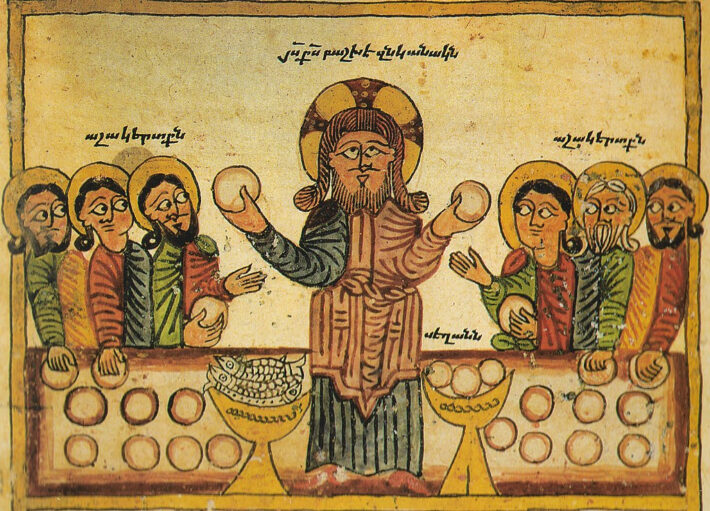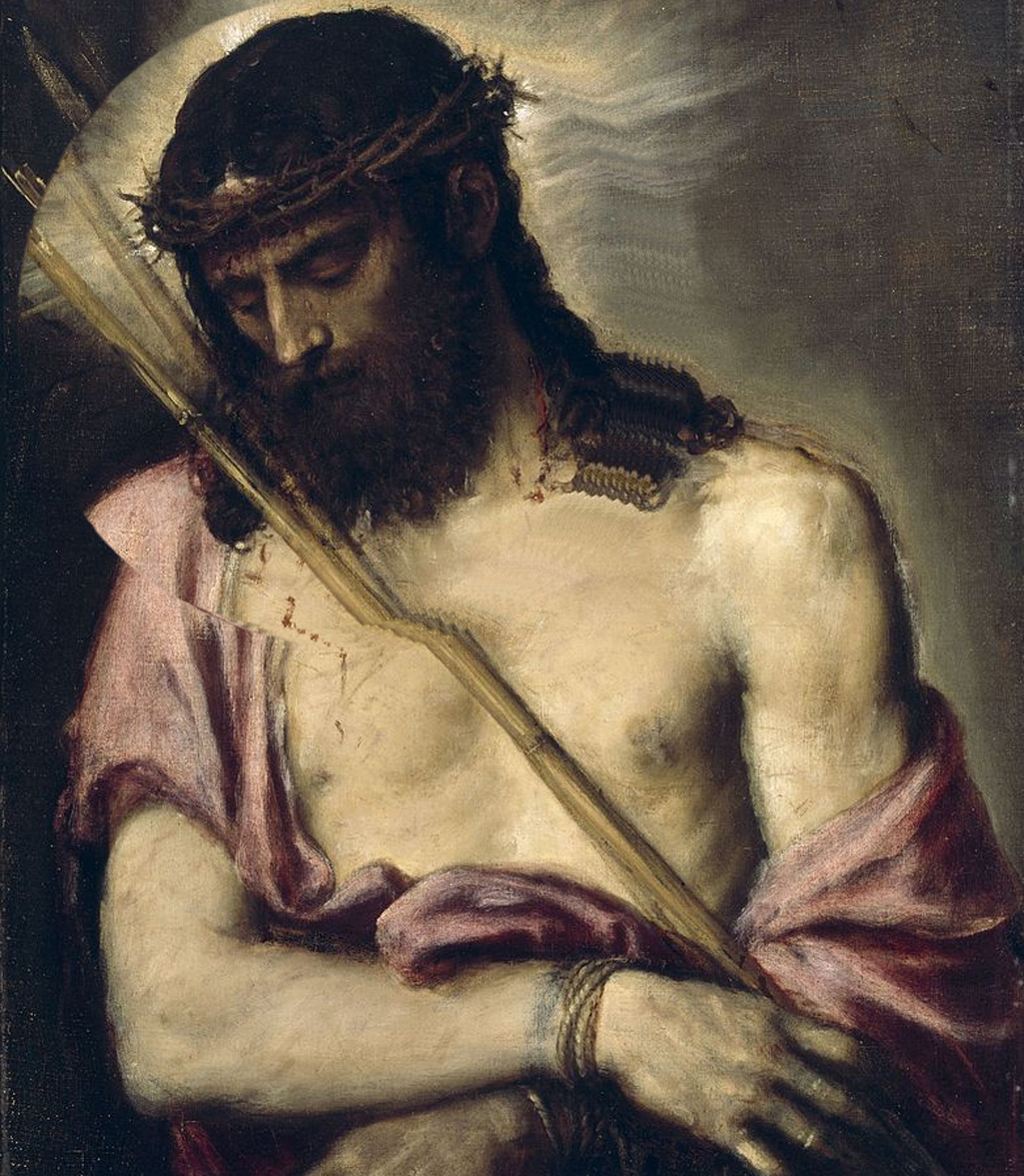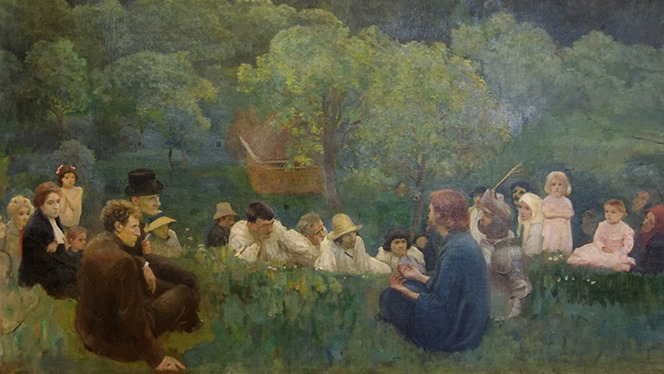Christian Art | Easter To Pentecost
John 6: 52-59 Audio Bible KJV | King James Audio Bible | King James Version | Daily Verses
52 The Jews therefore strove among themselves, saying, How can this man give us his flesh to eat?
53 Then Jesus said unto them, Verily, verily, I say unto you, Except ye eat the flesh of the Son of man, and drink his blood, ye have no life in you.
54 Whoso eateth my flesh, and drinketh my blood, hath eternal life; and I will raise him up at the last day.
55 For my flesh is meat indeed, and my blood is drink indeed.
56 He that eateth my flesh, and drinketh my blood, dwelleth in me, and I in him.
57 As the living Father hath sent me, and I live by the Father: so he that eateth me, even he shall live by me.
58 This is that bread which came down from heaven: not as your fathers did eat manna, and are dead: he that eateth of this bread shall live for ever.
59 These things said he in the synagogue, as he taught in Capernaum.
The Jews understand what Jesus is saying to him, but they cannot believe it. How can Jesus give to us his own flesh to eat? This seems impossible and also terrible. Jesus is not speaking symbolically, figuratively or metaphorically. Indeed, our usual English translations may soften the impact of what Jesus is saying, whereby for ‘eat’ it has been said that we might more accurately, according to the Greek [‘trwgwn’ – as this would appear in the symbols font], read ‘chew upon’, or ‘gnaw upon’. This provides us with a further insight as we consider the ways in which we partake of the deity, in which we consume the body and blood of Christ. We may too reflect upon Jesus’ Passion and the flogging our Lord suffered there, cutting his flesh to the bone, and in the course of which many would have died. Jesus will offer his precious body to be ripped apart.
Jesus once more contrasts the gift of his own body with the manna given to the Israelites to eat during the Exodus, which bread of heaven they ate and yet they still went on to die. Christ is the living bread. He is the bread that has come from heaven. Christ’s origin in heaven is, as John tells us, what sets him apart and enables our redemption. Jesus explains: just as he lives because of the Father, so we live through Christ. We are called to share in his supper and so to have life eternal.
‘The Saviour has instituted the most august sacrament of the Eucharist, which truly contains his flesh and blood, so that he who eats this bread may live forever; whoever, therefore, makes use of it often with devotion so strengthens the health and the life of his soul, that it is almost impossible for him to be poisoned by any kind of evil affection. We cannot be nourished with this flesh of life, and live with the affections of death… Christians who are damned will be unable to reply when the just Judge shows them how much they are to blame by dying spiritually, since it was so easy for them to maintain themselves in life and in health by eating his Body which he had left them for this purpose. Unhappy souls, he will say, why did you die, seeing that you had at your command the fruit and the food of life.’ St Francis de Sales

![]()
Audio Bible KJV | King James Audio Bible | King James Version | Endnotes
What Does It Mean To Eat Jesus’ Flesh And Drink His Blood?
The Catholic Church traditionally interprets Jesus’ words in John 6 as referring to the Eucharist. According to Catholic doctrine, during the Mass, the bread and wine become the actual body and blood of Christ through a process called transubstantiation. The bread and wine retain their outward appearances, but their substance changes into the substance of Christ’s body and blood. By consuming the Eucharist, Catholics believe that they are literally partaking in the body and blood of Christ, which gives them spiritual nourishment and grace.
This interpretation is supported by the writings of the Church Fathers, such as Ignatius of Antioch, who wrote in the early second century: ‘They [the Gnostics] abstain from the Eucharist and from prayer, because they confess not the Eucharist to be the flesh of our Saviour Jesus Christ.’ (Letter to the Smyrnaeans 7:1) Similarly, Augustine of Hippo wrote in the fourth century: ‘The bread which you see on the altar, having been sanctified by the word of God, is the body of Christ.’ (Sermon 227)
Protestant interpretations of John 6 vary. Some interpret Jesus’ words metaphorically, arguing that eating his flesh and drinking his blood represent believing in him and accepting his sacrifice on the Cross. Others view the passage as referring to spiritual communion with Christ, rather than physical ingestion of his body and blood.
John Calvin, prominent Protestant theologian of the Reformation era, wrote: ‘It is a spiritual eating which the faithful alone know, and which produces life in them; for they are joined to Christ by faith, and draw life from him, as the members from the head, as the branches from the vine.’ (Institutes of the Christian Religion, 4.17.19)
A key aspect to consider when interpreting John 6 is the cultural and historical context of the passage. In Jewish tradition, eating the flesh and drinking the blood of an animal were prohibited under the Mosaic Law (Leviticus 17:10-14). This would have been a shocking and offensive idea to Jesus’ Jewish audience.
Some scholars suggest that Jesus may have been intentionally using shocking language to test his followers’ faith and commitment. In John 6:66, many of his disciples turned away from him after hearing this teaching, indicating that it was a difficult and challenging message to accept.
Throughout history, religious figures and scholars have offered interpretations. In the 13th century, the theologian Thomas Aquinas wrote: ‘The mode of Christ’s presence in this sacrament is twofold, that is, sacramental and substantial.’ (Summa Theologiae, III, Q. 75, A. 1) Aquinas argued that the bread and wine are transformed into the body and blood of Christ in a substantial way, but they still retain their original appearance, taste, and texture.
In the 16th century, Protestant reformer Martin Luther rejected the doctrine of transubstantiation, but he still affirmed the importance of the Eucharist as a means of receiving Christ’s body and blood. He wrote: ‘It is the true, natural body of Christ which is in heaven at the right hand of God, and not a symbolic or figurative body such as the Zwinglians, the papists and others dream,’ (The Sacrament Of The Body And Blood Of Christ, Against The Fanatics).
A further important aspect to consider when interpreting John 6 is the relationship between the passage and the Last Supper narrative in the synoptic Gospels. In Matthew, Mark, and Luke, Jesus uses similar language when he tells his disciples to eat the bread and drink the cup, which he identifies as his body and blood.
The Last Supper takes place in the context of the Passover meal, and Jesus explicitly connects the bread and wine to the new covenant that he is establishing through his death. The Last Supper narrative reflects a sacramental understanding of the Eucharist, spiritual and mystical dimensions of communion with Christ.

Pagans Thought Early Christians Cannibals – Anthropophagi
There is an historical record of early Christians being accused of practicing cannibalism by their pagan neighbours. This accusation likely arose from the ritual of the Eucharist.
The earliest recorded accusation of cannibalism against Christians comes from the Roman historian and senator Tacitus, who wrote in his Annals (AD 116) that Emperor Nero accused the Christians of ‘abominations’ and ‘the hateful deeds for which the perpetrators are commonly known as Christians’, including the ‘strange and novel’ practice of ‘feasting on the flesh and blood of an infant’.
Early Christian writer Tertullian wrote in his Apology (AD 197) that the pagan accusations of cannibalism were based on a misunderstanding of the Eucharist. He explained that ‘when the words of Christ are uttered over the bread and wine, they are transformed into flesh and blood, which sustains our own flesh and blood’, but that this transformation is a spiritual and symbolic rather than a literal one.
Justin Martyr and Irenaeus were two influential Christian writers of the second century AD, and both wrote extensively on the topic of the Eucharist and its relationship to accusations of cannibalism.
In his First Apology, written around AD 155, Justin Martyr defends Christianity against charges of atheism and cannibalism. He explains that the Eucharist is not a literal consumption of Christ’s flesh and blood, but a symbolic representation of his sacrifice on the cross. He writes: ‘We call this food Eucharist, and no one else is permitted to partake of it, except one who believes our teaching to be true…not as common bread or common drink do we receive these; but since Jesus Christ our Saviour was made incarnate by the word of God and had both flesh and blood for our salvation, so too, as we have been taught, the food which has been made into the Eucharist by the Eucharistic prayer set down by him, and by the change of which our blood and flesh is nurtured, is both the flesh and the blood of that incarnated Jesus.’
Similarly, Irenaeus, in his Against Heresies, written around AD 180, defends the orthodox Christian view of the Eucharist against the heretical teachings of the Gnostics. He argues that the Eucharist is not a physical consumption of Christ’s body and blood, but a spiritual nourishment that strengthens the faith and soul of the believer. He writes: ‘For as the bread, which is produced from the earth, when it receives the invocation of God, is no longer common bread, but the Eucharist, consisting of two realities, earthly and heavenly; so also our bodies, when they receive the Eucharist, are no longer corruptible, having the hope of the resurrection to eternity.’
Both Justin Martyr and Irenaeus emphasized the symbolic nature of the Eucharist and its spiritual significance for believers. They saw accusations of cannibalism as a misunderstanding of Christian practice, and sought to explain the true meaning of the Eucharist in a way that would be acceptable to both Christians and non-Christians alike.
Transubstantiation
The doctrine of transubstantiation is a Roman Catholic teaching that holds that during the Eucharistic celebration, the bread and wine actually become the body and blood of Jesus Christ. This transformation is believed to occur through the power of the Holy Spirit and the words of consecration spoken by the priest.
According to this doctrine, the substance of the bread and wine is transformed into the substance of Christ’s body and blood, while the accidents or physical properties of the bread and wine (such as its taste, color, and texture) remain the same. So, while the bread and wine still look and taste like bread and wine, they are believed to contain the actual presence of Jesus Christ.
The doctrine of transubstantiation was formally adopted by the Fourth Lateran Council in 1215, and it remains a fundamental teaching of the Roman Catholic Church. It is not accepted by all Christian denominations, however, and many Protestant churches hold to a symbolic interpretation of the Eucharist, seeing it as a memorial or commemoration of Christ’s sacrifice rather than a literal transformation of bread and wine into his body and blood.
Thomas Aquinas developed a comprehensive understanding of the doctrine of transubstantiation. He argued that the substance of the bread and wine is changed into the substance of Christ’s body and blood, while the accidents of the bread and wine remain the same. He also explained that this change occurs through the power of the Holy Spirit, who operates through the words of consecration spoken by the priest.
Aquinas saw the Eucharist as a sacrament that is both a sign and a cause of the unity of the Church, and he emphasized the importance of receiving it worthily and with faith. He also defended the doctrine of transubstantiation against critics who questioned its philosophical and theological coherence.
Tantum Ergo Sacramentum
‘Tantum Ergo Sacramentum’ is a Latin hymn that is traditionally sung during Eucharistic Adoration, a Catholic devotion that involves worshiping the Eucharist outside of the context of the Mass. The hymn was written by the famous theologian and philosopher Thomas Aquinas, who is considered one of the most important thinkers in the history of the Catholic Church.
The hymn is a meditation on the mystery of the Eucharist, and it praises the sacrament as a source of grace and spiritual nourishment for believers. The title ‘Tantum Ergo Sacramentum’ means ‘Therefore So Great a Sacrament’, and it is a reference to the awe-inspiring nature of the Eucharist and its role in the life of the Church.
The hymn has been set to various musical compositions over the centuries, and it continues to be sung by Catholics around the world as a testament to their faith in the real presence of Christ in the Eucharist. Its words have also inspired many works of art and literature, as well as countless acts of devotion and adoration.
‘Tantum Ergo Sacramentum’ is actually the final two verses of a longer hymn called ‘Pange Lingua Gloriosi Corporis Mysterium’, also written by St. Thomas Aquinas. Here are the complete Latin and English texts of the hymn:
Latin:
Pange lingua gloriosi Corporis mysterium, Sanguinisque pretiosi, Quem in mundi pretium Fructus ventris generosi Rex effudit gentium.
Nobis datus, nobis natus Ex intacta Virgine, Et in mundo conversatus, Sparso verbi semine, Sui moras incolatus Miro clausit ordine.
In supremae nocte coenae Recumbens cum fratribus, Observata lege plene Cibis in legalibus, Cibum turbae duodenae Se dat suis manibus.
Verbum caro, panem verum Verbo carnem efficit: Fitque sanguis Christi merum, Et si sensus deficit, Ad firmandum cor sincerum Sola fides sufficit.
Tantum ergo Sacramentum Veneremur cernui: Et antiquum documentum Novo cedat ritui: Praestet fides supplementum Sensuum defectui.
Genitori, Genitoque Laus et iubilatio, Salus, honor, virtus quoque Sit et benedictio: Procedenti ab utroque Compar sit laudatio. Amen.
English Translation:
Sing, my tongue, the Savior’s glory, Of His Flesh the mystery sing; Of the Blood, all price exceeding, Shed by our immortal King, Destined for the world’s redemption, From a noble womb to spring.
Of a pure and spotless Virgin Born for us on earth below, He, as Man, with man conversing, Stayed, the seeds of truth to sow; Then He closed in solemn order Wondrously His life of woe.
On the night of that Last Supper, Seated with His chosen band, He, the Paschal victim eating, First fulfills the Law’s command; Then as Food to all his brethren Gives Himself with His own hand.
Word-made-Flesh, the bread of nature By His word to Flesh He turns; Wine into His Blood He changes: What though sense no change discerns? Only be the heart in earnest, Faith her lesson quickly learns.
Down in adoration falling, This great Sacrament we hail, Ancient types have long departed, Newer rites of grace prevail; Faith for all defects supplying, Where the feeble senses fail.
To the everlasting Father, And the Son Who reigns on high With the Holy Ghost proceeding Forth from Each eternally, Be salvation, honour, blessing, Might and endless majesty. Amen.








